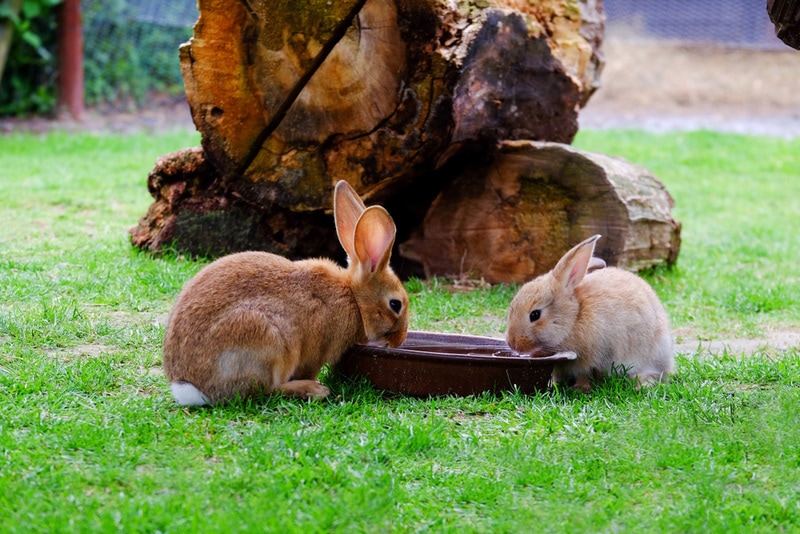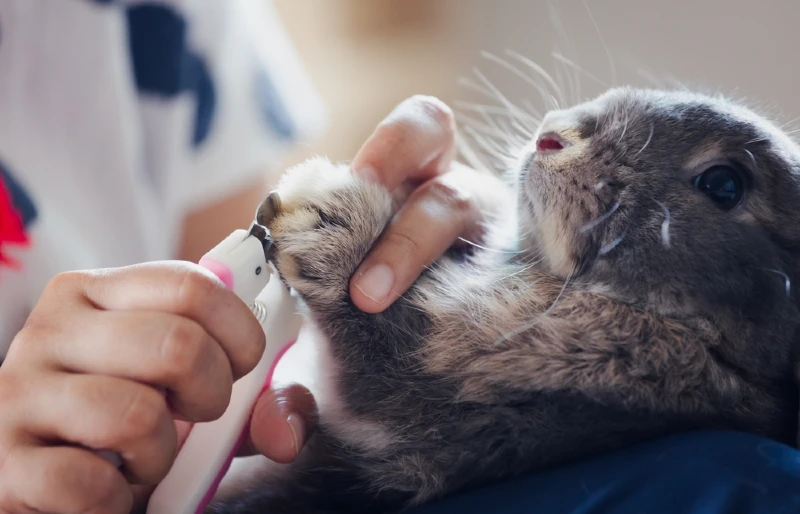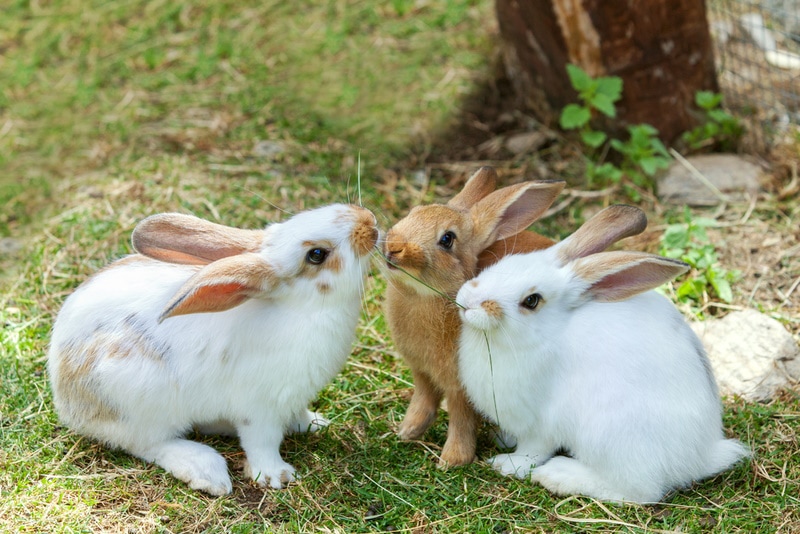Why Is My Rabbit Breathing Fast? 4 Likely Reasons
Updated on
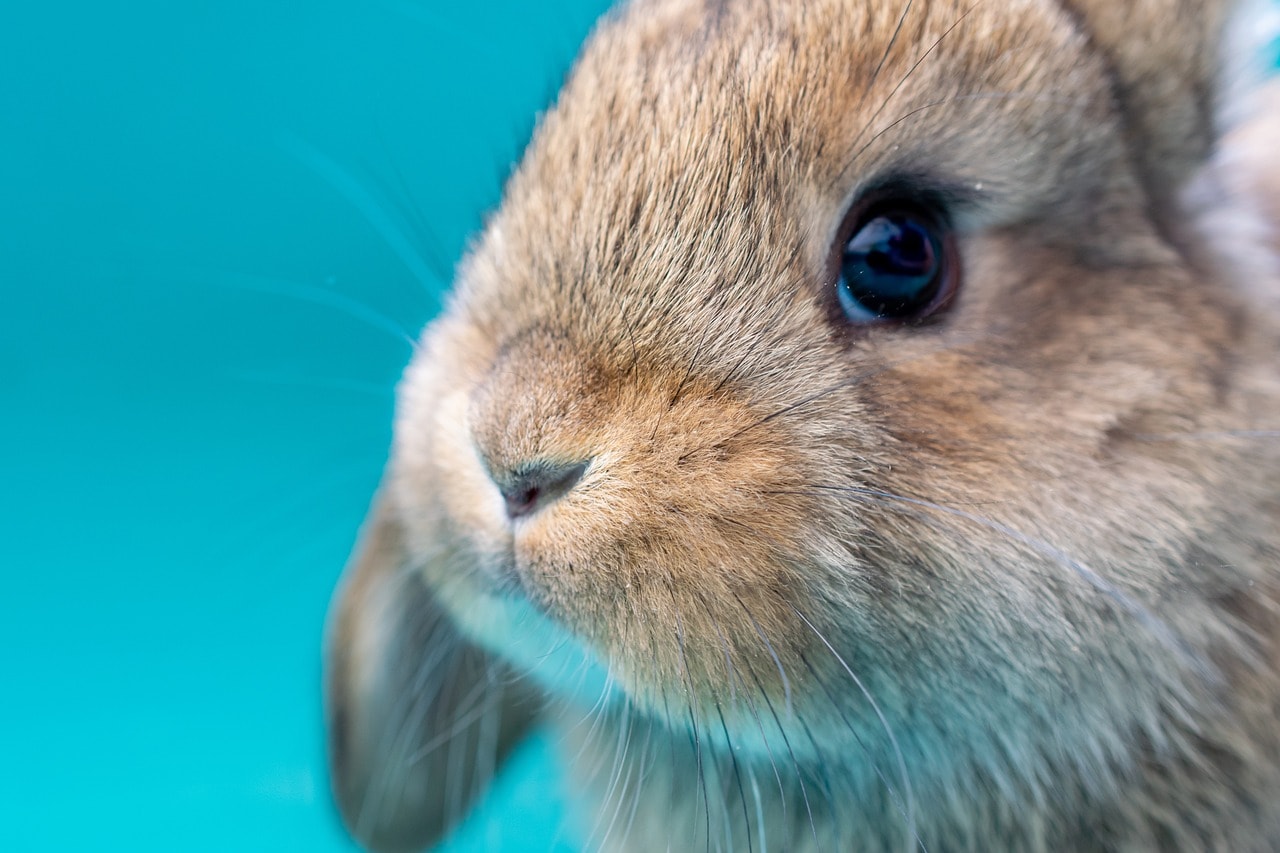
Healthy rabbits take 30-60 breaths per minute when they are calm and always breathe only through their nose. Rabbits might breathe fast for all sorts of different reasons. Most of these can be quite troublesome and require you to get your rabbit checked by a vet immediately. For instance, a rabbit may breathe fast due to overheating or an underlying illness.
There are very few benign reasons a rabbit may be breathing quickly. One of them is physical activity like playing and running around. Rabbits may also breathe fast due to stress or anxiety. If you notice this, you need to step in and stop or reduce the cause of their stress before it gets worse.
Below, we’ve listed several reasons your rabbit may be breathing fast.

The 4 Reasons Why Your Rabbit Is Breathing Fast
1. Heat
Rabbits can overheat easily, especially if they’re a breed that is more adapted to colder climates. Overheating can easily and quickly lead to heatstroke, which is a life-threatening disorder. This happens when rabbits don’t have adequate shade or get trapped in a hot, enclosed area. Many rabbits are sensitive to heat, so you must monitor your rabbit carefully in hot weather or while exercising.
When a rabbit’s body temperature rises, their heart rate increases and they may begin to breathe rapidly to cool down. They may seek out cooler spots or lay flat on the floor (if it is cool). Rabbits do not have sweat glands and cannot regulate their body temperature with the same efficiency humans can. Your rabbit may show several signs that they are overheating. For instance, breathing through their mouth, shallow fast breaths or panting, lethargy, loss of appetite, weakness, collapse and sometimes even death may occur.
To prevent overheating, your rabbit should always have access to a shaded area and plenty of fresh water. Do not leave your rabbit’s hutch in direct sunlight, which can make them overheat quickly. You should consider using fans to keep your rabbit’s area cool during hot seasons. The ideal environment temperature for a rabbit’s living space is 64.4 – 68 °F (18-20 °C). If the air temperature gets higher than this, ensure that there is a cool place they can retreat to. Never leave them in the car on a warm day or in an enclosed space prone to overheating, such as a greenhouse.
If you notice signs of overheating, take steps to cool your rabbit down immediately and call your vet at the same time. You can take them somewhere cool and ventilated, offering cold water or misting them with a spray bottle. Make sure to remain calm and minimize their stress. If they will tolerate it, place them on a cold, wet towel or cloth-wrapped ice pack. Do not cover them with a towel as this will make them even hotter. While doing all of this, get someone to start your car and turn the air conditioner on so you can be on your way to the vet straight away. Be careful not to bring your rabbit’s temperature down too quickly, as this can lead to shock and shivering, which will increase the body temperature again. You should seek the closest veterinary care immediately if you believe your rabbit is overheating or has a heat stroke.
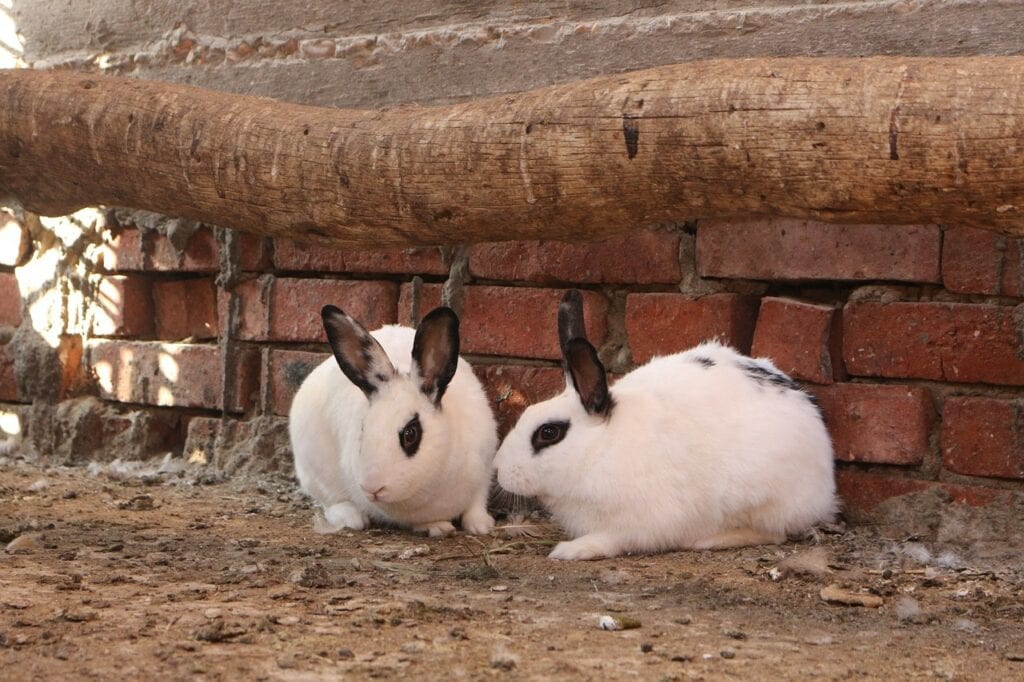
2. Stress And Fear
Stress, fear and anxiety can also cause your rabbit to breathe rapidly. Rabbits aren’t the toughest animals out there, so they tend to be fearful and extra-prone to stress and anxiety. This behavior helps them stay alive in the wild, though it can also bring various health problems.
Just about anything can cause your rabbit stress and fear, especially if they aren’t used to it. However, there are some things that most rabbits find stressful, such as:
- Loud noises. Most rabbits have sensitive hearing, so loud noises affect them more than other animals. Thunder, fireworks, sound of other animals and construction work can all lead to stress and anxiety.
- Changes in routine. Rabbits love routine, like most pets. If their routine is disrupted, the rabbit can become stressed and anxious. You should try to keep your rabbit’s routine as even as possible. However, if you have to change their routine, do it gradually over at least a week to try and minimize their stress.
- Predators. Rabbits are naturally cautious of anything or anyone they consider a predator, such as dogs and cats. Even with very early, gradual, and gentle interspecies socialization, this is likely to be a constant source of stress for the rabbit. Always avoid exposing your rabbit to other pets such as dogs and cats, especially unsupervised, as this can cause more harm than benefit.
- Illness. Rabbits will become stressed and anxious when they are ill. Even minor health conditions can make them anxious.
Common signs that your rabbit is stressed include having ears flat and tight against their body, tensing up, crouching or lying still on the ground to avoid being seen, lack of nose twitching, tucking in chin, running away, hiding, and thumping. If you notice your rabbit exhibiting signs of stress, you should attempt to reduce it straightaway. While this isn’t always immediately possible, taking small steps to make your rabbit feel more comfortable is vital to keep them happy and healthy. Try to keep their environment calm and quiet. Avoid stressors. For instance, you should avoid changing your rabbit’s routine, especially when they are sick. If you need to make a change, do it slowly over a week or so, giving your rabbit time to adapt.
Rabbits may become stressed at any point, and if you notice any signs, you need to make a change in their living environment to ensure that their five essential freedoms and welfare needs are met. However, if your rabbit seems more anxious than usual, you should seek prompt veterinary attention.
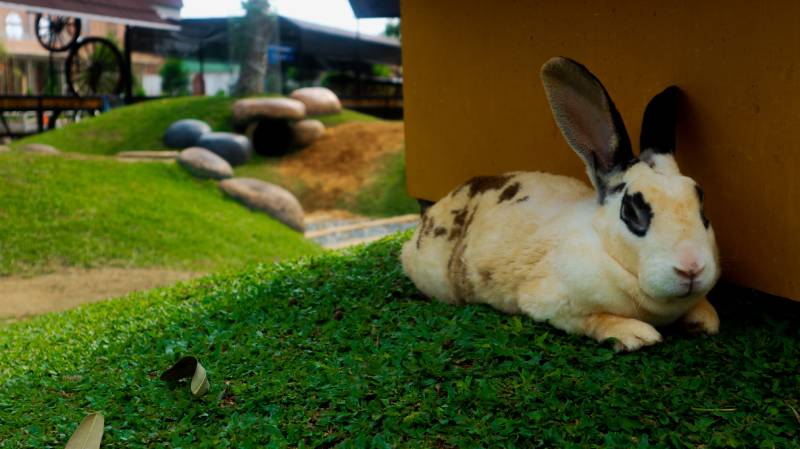
3. Illness
Rapid breathing can be a sign of several different health problems and all require urgent veterinary attention. If you think your rabbit is breathing fast or with difficulty, do not delay getting them checked by your vet the same day, as most of these illnesses can be life-threatening. Here are some of the most common health issues that cause rapid breathing:
- Upper respiratory infections. Infection and inflammation in a rabbit’s upper respiratory system, which involves the nose, sinuses, and throat, may cause rapid breathing, as the flow of air is reduced and compromised by swelling or discharge. Coughing, sneezing, and discharge from the nose are also common. Viral and bacterial infections can both fall into this category. Having their nose blocked up with discharge means your bunny cannot breathe properly and will use their mouth instead, which is a big red flag for rabbits.
- Pneumonia. Pneumonia is a particular kind of respiratory infection that affects the lungs and can cause serious problems for rabbits. It can be caused by bacterial, fungal, or viral infections that worsen. Rapid breathing, wheezing, lethargy, and loss of appetite are all common.
- Irritation of the airway and allergies. Irritation of the airway can occur when a rabbit breathes in dust, smoke, fireplace fumes, evaporating chemicals from household cleaning products, or an excessive amount of ammonia from dirty bedding. All of these could potentially lead to severe signs like rapid or labored breathing and sometimes discharge from the nose. If any larger particles, such as parts of bedding material or hay, get stuck in the rabbit’s nose, causing irritation and blocking the flow of air through the nose, rabbits will be breathing faster than normal. In addition to these potential environmental substances, rabbits can also be allergic to mites and fleas.
- Tumors. A rabbit may also breathe faster than normal due to a tumor in their nose, lung, or thymus gland. This is because tumors affect the tissues, causing them to increase in size and leading to swelling and inflammation. This means there is either a reduced flow of air through the nose (in the case of a nose tumor) or compression of the normal lung tissue (due to the presence of cancerous lung tissue or an enlarged thymus).
- Heart disease. Heart disease often causes fluid to build up in the lungs, leading to rapid breathing and other breathing problems. The condition can be congenital (rare) or acquired and can cause sudden death if left untreated.
- Infectious disease. Rabbits may breathe rapidly if they are infected with various bacteria or viruses that cause general illness. Reasons for this can be direct damage to the lungs as well as other organs, pain due to the illness itself, and shock and sepsis that happen when the disease has advanced. Rabbit Hemorrhagic Disease is caused by a nasty virus that attacks the internal organs, causing bleeding and pain. Myxomatosis is another viral illness that causes skin nodules, swelling around the eyes and genitals, pain, and potentially pneumonia, as the rabbit’s immune system is weakened.
If you think your rabbit is ill, you should contact your vet immediately. Rabbits tend to be rather sensitive creatures, so illnesses can quickly take a turn for the worst. Your vet will perform diagnostic tests to determine the underlying cause of the rapid breathing and then prescribe a proper treatment.
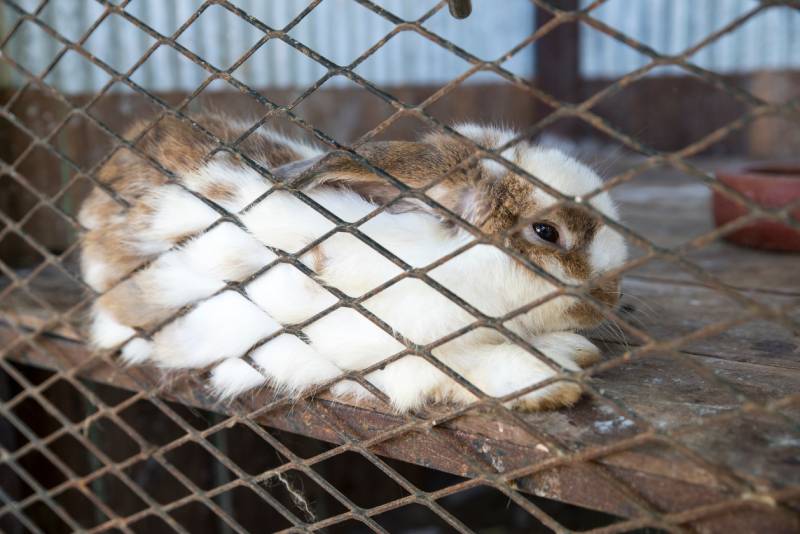
4. Pain
Pain is often associated with illnesses and injuries. However, it can occur for a variety of different reasons. When in pain, rabbits may show signs of discomfort, loss of appetite, reluctance to move, lethargy, and rapid breathing. In some cases, your rabbit will have a procedure at your vets’ and be discharged with painkillers. Pain in rabbits, if left untreated, often leads to serious and sometimes even life-threatening complications.
If your rabbit appears to be in pain for any reason, you should contact your vet immediately. Here are some of the most common reasons rabbits may show signs of pain:
- Gastrointestinal problems. Gut stasis, diarrhea, gastrointestinal blockages, and infections can cause rapid breathing due to pain, dehydration, and sometimes shock and sepsis. These conditions always require veterinary care, as rabbits have sensitive digestive systems. If left untreated, these disorders can even lead to death.
- Dental problems. Dental issues tend to be very painful, and your vet can diagnose them by examining your rabbit’s mouth, sometimes using X-rays. Therefore, this is one of the top reasons rabbits may be in pain that isn’t always readily apparent. Signs of pain due to dental disease often involve rabbits grinding their teeth, eating less or not eating at all, having a runny nose or weepy eyes, drooling, being lethargic, or having diarrhea.
- Urinary tract problems. Urinary tract infections, bladder sludge and stones can also be painful. Your vet can confirm these by examining your rabbit and performing additional tests. Urinary issues won’t cause rapid breathing directly, but they can cause pain which can then cause rapid breathing.
- Arthritis. Most rabbits over 6 years old will have a degree of arthritis. It is most common in the hip, elbow and knee joints, with giant breeds or obese rabbits being at particular risk. Rabbits may slow down, eat less, limp on the affected leg, and seem stiff. Arthritis causes significant and often constant pain that can make your rabbit breathe fast and always needs prompt veterinary attention.
- Injury. If your rabbit is injured, they may breathe rapidly due to the pain. When rabbits run around inside our homes or get handled by inexperienced people or well intentioned children, they can easily get injured. Cuts, bruises or more severe injuries such as limb fractures will cause pain, and will always require prompt veterinary treatment.
- Surgery. After most surgical procedures, rabbits may feel some pain. Pain medication should always be provided. However, it isn’t always possible to keep these rabbits completely pain-free at home, so your vet might recommend that your rabbit stays at the clinic so they can give them frequent and appropriate painkillers as they recover.
You should contact your vet immediately if you think your rabbit is in pain or has been injured. We have discussed many conditions and illnesses that will cause pain in your rabbit, which might cause changes in their breathing. Many of these can be severe and life-threatening, as rabbits are very sensitive to pain. Your vet will establish what the problem is and how to best treat your bunny. If your rabbit had a recent surgery, discuss the pain management plan with your vet to ensure that you understand what you need to be doing at home, how best to care for your recovering rabbit, and the potential signs of pain or discomfort in your bunny.
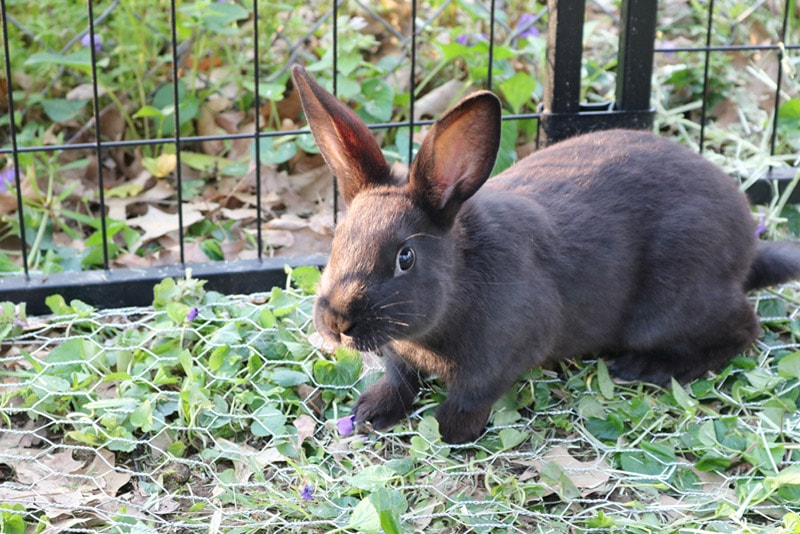
Final Thoughts
Rabbits can breathe rapidly for several reasons, most requiring veterinary care. The only underlying cause that does not warrant a trip to the vet is physical exercise. In most cases of stress and fear, you can typically alleviate much of your rabbit’s anxiety by following our advice and avoiding the stressors, ensuring a safe and comfortable environment for your bunny that is free of noise, dogs and cats.
Many illnesses in rabbits either cause direct changes in their breathing or lead to pain, which is why rabbits often breathe fast. Unfortunately, many of these can be quite serious and even life-threatening. If your rabbit appears to be breathing rapidly for any reason other than doing zoomies, you should contact your vet immediately so they can get prompt treatment.
See Also:
- My Rabbit Is Running Around Really Fast, What Does It Mean? 8 Reasons & What To Do
- Will My Rabbit Run Away if I Let It Outside? Safety Tips & More
Featured Image Credit: Coernl, Pixabay


